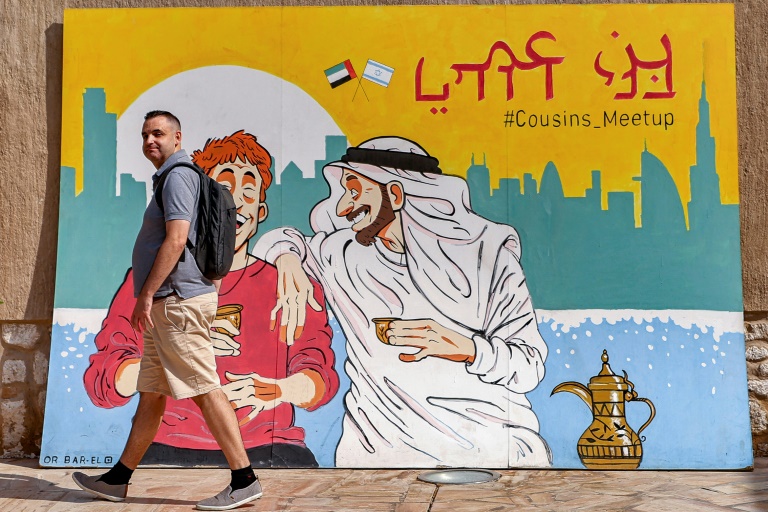Israel’s new Arab allies face uneasy balancing act

Israel and several Gulf states normalised relations in 2020, signing the US-brokered Abraham Accords
Dubai – Confronted with the war raging between Israel and Hamas, Arab countries which have normalised relations with Israel in recent years have been forced to balance diplomacy with fiercly pro-Palestinian Arab public opinion.
But as analysts predict a long and violent response from Israel in Gaza, the position faced by those nations is expected to become increasingly troublesome.
In the wake of the Palestinian militants’ surprise attack into southern Israel, the United Arab Emirates condemned the kidnapping of Israeli hostages in a break with other regional players.
The oil-rich state was the first Gulf country to establish diplomatic ties with Israel in 2020 under the Abraham Accords.
“We are very grateful to the United Arab Emirates for its stance supporting Israel”, said Liron Zaslansky, Israel’s Consul General in Dubai.
On Tuesday, as Israel bombed the besieged Gaza Strip, the UAE was also swift to announce $20 million in humanitarian aid for the Palestinians.
Joseph Bahout, director of the Issam Fares Institute for Public Policy and International Affairs in Beirut, explained the UAE and other signatories to the Abraham Accords — Bahrain and Morocco — would have to walk a “fairly narrow line” as they weighed commitments to Israel with public sympathy for Palestinians.
For the time being, they are navigating this “very uncomfortable” situation by “focusing on the idea of protecting civilians”, said Cinzia Bianco, Gulf specialist at the European Council on Foreign Relations.
However, Bahout explained the tactic would “not hold for long in the face of Israeli reprisals, which will probably be very violent”.
In Bahrain and Morocco, which have so far not moved beyond denouncing civilian casualties, demonstrations in support of the Palestinians were organised in the first days of the offensive.
– ‘Utopian’ idea –
But these kinds of expressions of public support will only gain momentum if the conflict persists, said King’s College London analyst Andreas Krieg.
“Even countries like the UAE, where there is no civil society, have to make sure that public rallying around the Palestinian cause is consistent with government policy and communication,” he added.
The escalation of the Israeli-Palestinian conflict has undermined one of the arguments made at the time of the signing of the Abraham Accords, negotiated under the administration of former US president Donald Trump.
Kuwaiti analyst Bader Al-Saif explained the move had “national interests in mind; but it has also been partly marketed as an outside-in approach to peace that could flip the stalemated conflict”.
“Now is the time for normalising states to use whatever capital they have with Israel to positively influence policy… as much as other states are expected to do the same with Hamas,” he added.
Karim Bitar, an associate researcher at the Institute for International and Strategic Affairs (IRIS), in Paris said the normalisation process did not address problems at the root of the conflict between Israel and the Palestinians — occupation, colonisation, the status of Jerusalem, water resources, and the fate of refugees.
“The idea of an economic peace, of a de facto solidarity that would be created and lead to a political peace, turned out to be utopian”, Bitar said.
Saudi Arabia, the pre-eminent power in the Gulf, has faced pressure to conclude its own normalisation with Israel at the urging of the United States.
Randa Slim, a researcher at the Middle East Institute think-tank in Washington, explained the Abraham Accords were “here to stay”, but “any future normalisation between Arab countries and Israel is on hold for the foreseeable future”.
